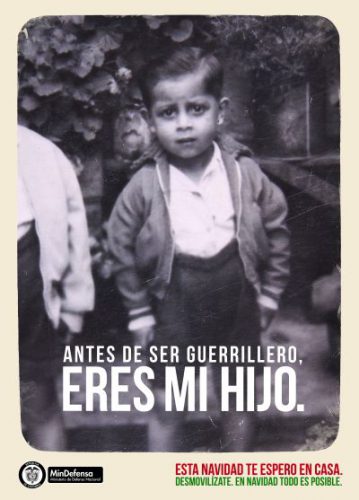
 Some incredible and beautiful news coming out of Colombia this week, and not just with their third place finish over the USA at the COPA. In a news cycle defined by #Brexit and the massive dip in your retirement portfolio, the 50+ year guerrilla insurgency FARC signed a cease-fire pact with the Colombian government. The odds are looking good that this war is officially over.
Some incredible and beautiful news coming out of Colombia this week, and not just with their third place finish over the USA at the COPA. In a news cycle defined by #Brexit and the massive dip in your retirement portfolio, the 50+ year guerrilla insurgency FARC signed a cease-fire pact with the Colombian government. The odds are looking good that this war is officially over.
If you need brushing up on your South American Contemporary History, the FARC were really bad guys, and they were that way for half-a-century. Seriously, they’re the South American version of ISIS, motivated by Marxism instead of religion. Kidnappings, executions, sexual assault, car bombs, child solders, drug trade, landmines- all this in a pre-social-media world. When you think of communist terrorist groups in South America, ruthless camouflaged beards chewing on comically large cigars, this is the source of your stereotype. Which is not to suggest that the Colombian government is without blame in FARC’s creation, with its own history of corruption and power grabs. But the FARC holds a unique place in the geopolitical world for its longevity and violence, which may soon be coming to an end.
So thanks be to God that the violence is over. Let’s pray for the peace to last. And let’s look at how a grace-infused strategy completely changed the conversation about how rebellions and insurgencies are ended.
The above is a TED Talk by Jose Sokoloff about his design firm’s work to help the government fight the FARC through public relations campaigns. The PR (or as one might rightly suggest, propaganda) used by the Colombian government is by far the most creative use of gospel-styled messaging in geopolitical conflict I have ever seen. Watch the video if you have time, but if not, here’s a summary:
- Sokoloff and firm, after interviewing FARC defectors, discovered the key insight that defined their whole campaign: “guerrillas are as much prisoners of their organizations as the people they hold hostage.”
- Radio ads were developed with the voices of actual defected guerrillas, encouraging soldiers to come home to a better life.
- Images of guerrillas as children were put on signs and broadcast on TV screens, with messages from their mothers begging them to come home. (Look! Another post about Guerrilla moms!)
- Floating balls of light, packed with gifts and notes, were sent down jungle rivers at night, a beautiful display of well wishes for the enemy.
- Christmas Trees, connected to motion sensors, would light up as guerilla soldiers moved through the jungle at night. Signs at the trees would lit up to say: “If Christmas can come to the jungle, you can come home. Demobilize. At Christmas, anything is possible.” This one campaign was responsible in demobilizing nearly 5% of the remaining guerrilla army in 2014.
The whole campaign is a work of reconciling art, an invitation to melt AK-47s into farm equipment. And it worked! As of last week, the intensely long peace talks concluded with a cease fire, which is expected to be formalized soon.
It’s always dicey talking about forgiveness as a diplomatic or political tool. After all, the FARC conflicts are responsible for nearly 220,000 deaths. Those were somebody’s kids, parents, and friends. And yet, the current plan is to have the guerrilla leadership submit to a tribunal (much like a truth-and-reconciliation committee) with light punishments like social work to be completed before reentering society. It’s dicey again because we shouldn’t presuppose that the Colombian government is innocent either. All governments at war, regardless of the righteousness of their cause, have actions to apologize for.
And yet… here we are. The FARC is disbanding, and there is closure and peace for the half-million displaced Colombians. Here’s what the current FARC leader told The Guardian earlier this week:
We repent everything, not just the war but things that we have done in life. But beyond my personal case, one has to put this into political context. Personally, yes of course, there are always things to repent. We would like to rewind the movie, not to have been part of those situations.
We made decisions that in the heat of the moment we thought were fair and necessary, because otherwise there would have been great consequences for own forces. And then, in hindsight, one does see things differently. But you have to see them in the context that they actually happened.
A somewhat defensive repentance, but repentance nonetheless. It’s an outcome with Pope Francis’s fingerprints on it, for sure, though Venezuelan President and general bad-guy Hugo Chavez was part of the process as well. And yes, the FARC is switching to more democratic and political methods of bringing Marxist ideals to Colombia, and yes, there are other violent groups that could take its place. But no matter how many qualifications we tack on here, a threshold seems to have been crossed. A beautiful thing has happened.
The gracious parallels between good religion and this conflict are stark. One-way love and forgiveness aren’t just disarming in the realm of diplomacy. It’s the same way in our relationships with our families, our kids, our coworkers, our enemies, and our friends. If you want to unroll the spiritual, emotional, or relational hedgehog, if you want to disarm the metaphorical or geopolitical FARC, grace is the only tool in the belt for that task.
We could also easily say here that justice, for all its goodness and importance, cannot convince a rebel to disarm. As the war began to draw to a close, the concerns of the rebels were not “how can we win” but “what will happen to us when the war is over.” This is why the actual disarming piece of the puzzle was the key issue for peace talks. The FARC leadership wanted guarantees that once they were rendered weaponless, they would not become scapegoats for satisfying a half-century of rage and sorrow.
It’s no coincidence that the bible uses this imagery of kingdom and rebellion to discuss our relationship with heaven. “Today, if you hear his voice, do not harden your hearts as you did in the rebellion” says Hebrews. “For if, while we were God’s enemies, we were reconciled to him through the death of his Son, how much more, having been reconciled, shall we be saved through his life!” exclaims Romans. Which is all well and good when we apply it to ourselves. But despite our own forgiven-ness, when we apply it to the FARCs and ISISs of the world, that’s when we start reaching for the antacids. The divine insight that “sinners are as much prisoners of their trespasses as the people they trespass against” means it’s gotta be grace and forgiveness if you want both the relationship and peace.
So, if you’re a praying person, say a prayer for Colombia. This kind of peace- the good peace that lasts, requires the kinds of sacrifices that caused Jesus to bleed and die. But if Colombia can embrace it, they’ll have a brief glimpse of that peace which passes all understanding.
https://www.youtube.com/watch?v=eTDeA313H80

COMMENTS
5 responses to “Christmas in Colombia: The Gracious End of FARC”
Leave a Reply














Completely mind-blowing! There’s this year’s Christmas Eve sermon all sorted. Thanks, B!
Cannot get over this. What an amazing story.
The widespread hunger for peace in Columbia is fantastic news, but I hope that both sides are operating in good faith — I am no expert, but this sent me to google and to this. http://www.truth-out.org/news/item/34951-human-rights-activists-dispute-success-of-plan-colombia. Perhaps the US government needs to hear from us, as it sends hundreds of millions of dollars to support the process — that forgiveness and a true beginning will mean none of this is forgotten or swept under the rug. The temptation to say, “peace, peace, where there is no peace,” seems always with us.
Thanks for this report.
Today’s lengthy report from the Times is stomach turning.
http://www.nytimes.com/2016/09/11/world/americas/colombia-cocaine-human-rights.html?emc=edit_ta_20160910&nlid=22739177&ref=cta
I long to see the transformation of Columbia, through forgiveness and mercy. Keep praying.
[…] Christmas in Colombia — Bryan J. finds parallels in the disarmament of terrorist group FARC in Columbia and the Christmas story. […]